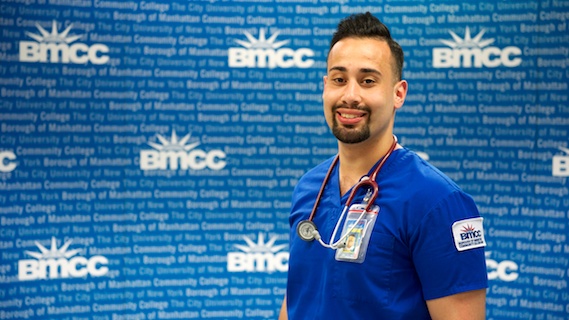
The nursing program at BMCC is respected across the City for its rigorous standards.
Admittance is contingent on passing the HESI A2 Admission Assessment Exam—a predictor of student success in nursing school—and once enrolled, students must maintain a minimum grade point average in courses including anatomy and physiology. They also complete units on obstetrics, psychiatric nursing and pediatrics.
Justin Vargas is uniquely prepared to meet those challenges.
Before immersing himself in the BMCC nursing program, he took just a few classes and meanwhile, completed the Medical Assistant Specialist (MAS) program in BMCC’s Center for Continuing Education and Workforce Development.
“I would go to continuing ed during the day, nine to five at 25 Broadway, then I’d walk up to the main campus and take the prerequisite courses in the nursing program,” he says.
“In nursing studies there’s a whole language to learn, the medical language. I only had a semester with the medical assisting program, but it put me up there in my nursing classes with people like EMTs who had been working in the medical field for years. I even tutor other students.”
Finding support
Vargas’ confidence was kick-started by the support he found in the staff and faculty in BMCC’s continuing education department. “They care,” he says. “You can sit for hours after class to go over stuff.”
One person in particular, Wanda Izquierdo-Ortega, Program Manager for Allied Health in adult education, made an impression on him.
“She just told me to do it,” he says. “She was a coach for me. She sat me down and talked to me with that fiery attitude and gave me the positive reinforcement I needed. It’s not that students aren’t serious, but sometimes we lack confidence.”
As a nursing student, he has completed clinical rotations where he sees first-hand how nursing teams operate in busy urban hospitals.
In one of his clinical rotations, he says, “The aide had a patient with a catheter. It was full and he kept picking it up above his waist. This was causing infections, but he didn’t know better. Having the MAS certificate gave me the confidence to say to the doctor, ‘Hey, he doesn’t know the proper way to carry his catheter bag. He hasn’t been instructed’.”
Honing instincts
Now a full-time nursing student at BMCC, Vargas has completed a psych rotation at Lincoln Hospital in the South Bronx, and completed lab assignments at the New York Simulation Center for Health Sciences (NYSIM), located in Manhattan’s Bellevue Hospital Center.
“The simulators are awesome,” he says of the “human mannequins” used for training purposes with nursing and medical students from colleges around the City.
“They put you in situations where you can hone your instincts,” he says. “Here’s an example. We had to respond to a post-partum hemorrhage. You have to feel; you have to palpate the ‘patient’. You can hear the respiration, and see the numbers change on the monitors as a nurse enters the data from the patient.”
Role models
Justin Vargas moved to the Bronx with his parents when he was about seven years old. He attended Our Saviour Lutheran High School in the Bronx and after graduating, worked at a Verizon call center.
Next, he worked as an administrative assistant in the Emergency Department at the New York Westchester Square Medical Center in the Bronx—and that piqued his interest in nursing, though his awareness of the field began in childhood.
“My mother’s a nurse, and I saw the way people called her and she gave advice about health issues,” he says. “She was a hero to me. Then working in a hospital, I saw the level of skills the nurses had. It was awesome. They can take those skills anywhere, any city.”
Another important influence, he says, “was my best friend’s mother. She’s an alumna of BMCC, and encouraged me to get a certificate, or be a technician of some type in the medical area. She told me, ‘Go on the BMCC website, they have everything’.”
Advocating for patients—and other students
“Today, healthcare is moving toward a more holistic approach,” Vargas says.
“Nutrition counseling, for example, is big now. But patient advocacy is my passion. We learn cultural sensitivity in every aspect of our nursing studies, and it helps me, when I do one-to-one now. We sit at arm’s length from a patient and counsel them on how they’re doing.”
Eventually he wants to earn a bachelor’s degree in nursing, specializing in patient advocacy, and his gift for advocacy doesn’t stop with patients.
“Now that I’ve been through it,” he says, “I would love to get a peer-to-peer mentoring group from the nursing department to go down to continuing ed and talk to other students like me, about the nursing program at BMCC. It’s the student-to-student support, sometimes, that gets you through.”
STORY HIGHLIGHTS
- Justin Vargas became a certified Medical Assistant Specialist through the BMCC continuing education department
- He also enrolled in the nursing program at BMCC
- Role models and mentors inspired him along the way

